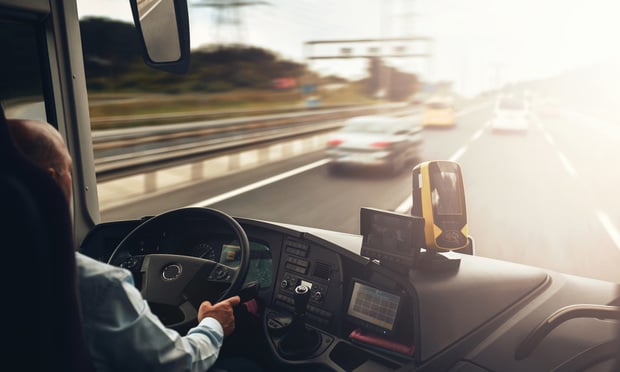(Bloomberg) — Insurance companies around the world are promising lower rates on car coverage. The catch is they want to install the equivalent of an airplane's black box to track how and where you drive.
Smartphone applications and devices that record trip and vehicle data are set to infiltrate auto insurance at a rapid pace, bolstered by discounts of as much as 30%. Consultancy Oliver Wyman forecasts that car insurance using driver data to set prices will grow 40% a year to become a $3.6 billion market by 2020.
For insurers, it will provide fine-grained information on an individual's driving style, like flooring it to beat a red light, to improve returns in the competitive segment. For drivers, Big Brother-like monitoring offers the prospect of lower rates and faster response time in the event of an accident, including medical assistance and repairs. In any case, the shift away from standard practices of rating customers by age and driving history might be unavoidable.
"In the not-so-distant future, it will become a market standard," said Domenico Savarese, who heads vehicle-data efforts at Zurich Insurance Group AG, which provides auto coverage for about 15 million drivers in as many as 30 countries. As autos become increasingly equipped to gather and transmit data, "motor insurance will by definition need to change."
Insurer Shortcut
Auto coverage in Europe generates about 130 billion euros ($160 billion) of premium income a year, the largest segment aside from life insurance. Because motor insurance is largely standardized, insurers fight for market share with lower rates.
That's meant Germany's car insurance market, Europe's biggest, has been unprofitable for carriers since they intensified price cuts in 2005. Insurers in the U.K., Europe's second biggest, are also seeking ways to end years of underwriting losses.
Insurers are looking for alternative tariffs, and rates based on individual data may make it tougher for consumers to compare prices. Roland Berger Strategy Consultants counted insurers on six continents and about 30 countries working on user-based programs, according to a study. That's becoming feasible due to trends in the auto industry.
Axa Savings
Manufacturers from Volkswagen AG to BMW are making cars more connected to add features that warn other vehicles of traffic jams and ultimately to facilitate autonomous driving. Regulators are also underpinning the spread of the technology. European Union legislation will require new cars to have a system that automatically notifies emergency services after a serious crash, relaying basic data about location of the accident even if the driver is unconscious.
Still, carmakers haven't made the data readily available as they seek to protect their turf. That's caused insurers to side step the manufacturers with devices that gather that information independently.
"Since carmakers are sitting on the data, insurers are taking a shortcut," said Juergen Reiner, a partner at Oliver Wyman. "That means insurers get that part of the customer relationship, at the carmakers' expense."
In Ireland, Axa SA is promoting its Drivesave program with discounts of as much as 20% to drivers from 17 to 24 years old. The service uses a smartphone app to record data such as acceleration, speed, distance and stopping force. Another 10% a year could be saved if customers continue to drive safely.
Allianz Expansion
In Axa's home country of France, a similar program will be introduced next year that may reward good drivers and penalize bad ones.
Allianz SE, Europe's largest insurer, is following a similar path and will open a center at its Munich headquarters next year to expand its monitored-driver offering to 10 countries from four.
For decades, commercial airliners have been equipped with voice and data recorders that record flight information and can help determine the cause of an accident. While privacy concerns exist in expanding that capability to cars, the lure of lower premiums and added safety is a powerful incentive, especially among younger drivers who are accustomed to permanent connectivity.
'Ultimately Unstoppable'
"We don't want to get data that we don't need, so we don't become a Big Brother," said Zurich's Savarese. "Clearly, we want to know if there's an accident, and that's probably the moment when we will want to know the most about your drive."
While user-based car insurance makes up less than 5% of the market, the share is expected to soar to 26% in the U.S. and 38% in the U.K. by 2020, according to the November study from Roland Berger Strategy Consultants.
"We think it's ultimately unstoppable," said Juergen Thiele, a partner at Roland Berger. "It'll be a market standard, even though we'll see some of the old tariffs remain."
–With assistance from Oliver Suess in Munich.
Want to continue reading?
Become a Free PropertyCasualty360 Digital Reader
Your access to unlimited PropertyCasualty360 content isn’t changing.
Once you are an ALM digital member, you’ll receive:
- Breaking insurance news and analysis, on-site and via our newsletters and custom alerts
- Weekly Insurance Speak podcast featuring exclusive interviews with industry leaders
- Educational webcasts, white papers, and ebooks from industry thought leaders
- Critical converage of the employee benefits and financial advisory markets on our other ALM sites, BenefitsPRO and ThinkAdvisor
Already have an account? Sign In Now
© 2024 ALM Global, LLC, All Rights Reserved. Request academic re-use from www.copyright.com. All other uses, submit a request to [email protected]. For more information visit Asset & Logo Licensing.








